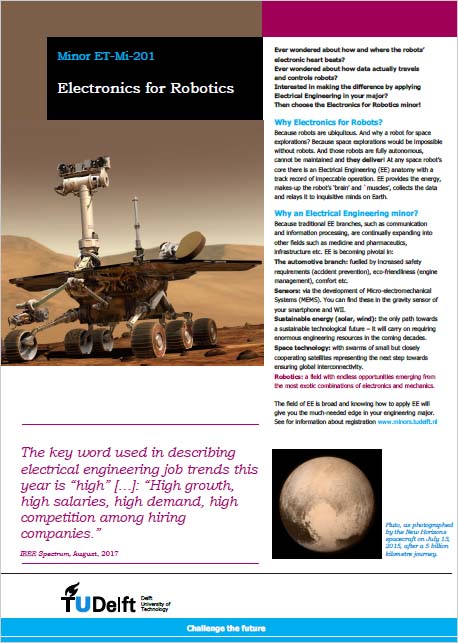Electronics for Robotics
ET-Mi-201
This minor offers you a wide range of courses and an integrating project, enabling you to build up insight and develop knowledge and skills in the field of Electrical Engineering (EE). You will then be able to make use of this insight and instruments your own (major) discipline. At the same time, with EE devices and solutions being ubiquitous in all branches of technology, understanding the foundations of EE as offered in this minor will be a real asset in your future career as an engineer.
Knowledge and skills are best validated via challenging and exciting projects. This minor converges towards such an integrating project where you will opportunely valorise your efforts invested in the various minor’s topics.
In short: Do you want to pursue your present major discipline? This minor will help you broaden your horizon and enable you to find unexpected solutions. Do you see yourself as a potential EE MSc student? This minor will allow you to validate your dream and will provide you with instruments to self-assess your readiness to enrol in such a programme. Contact the minor coordinator Leon Abelmann for more information.
Intended for
This minor is of special interest to students in Physics, Mechanical Engineering, Aerospace Engineering and Computer Science. Note that the students from Computer Science that already had the course CSE2420 “Digital Systems” in their programme must replace this course by the course CSE2220 “Signal Processing”.
All lectures of this minor will be given in English.
Learning objectives
The minor offers the following educational programme:
- Build-up knowledge and skills in the elementary disciplines of EE
- Build-up knowledge and skills to analyse and solve electrotechnic problems
- Develop capabilities to identify electrotechnic aspects in the major field of education
- Evaluate the potential use of various electrotechnic solutions in the major field of education
Courses in the minor
The minor offers the following educational programme:
-
Focuses on the analysis of linear electrical circuits and components, laying the basis for understanding the steady-state and transient behaviour of passive circuits.
-
Will give you an insight (in a structured manner) in the function of electronics as information-processing technique in our society.
-
Will start from an entry-level signal processing part and will then proceed to discussing the basic concepts of signal processing for telecommunications, with an emphasis on the transmission of digital signals. The concepts will be practiced with by solving problems with direct applicability.
-
Focuses on the two fundamental notions of digital systems, namely combinational and sequential networks, and the basics of Very High Speed IC Hardware Description Language (VHDL).
-
Provides a non-specialist foundation of wireless transfer of information, by starting from the analysis of guided electromagnetic waves propagation and extending this knowledge to basic, but illustrative free-space propagation phenomena. The course will also contain an entry-level discussion of antennas and the applicable performance indicators. On an overall, this course is intended to familiarise the students with the wired and wireless implementation of data transfer in robots.
-
Will start by discussing the power electronics that are needed for a, presumably battery/solar panel operated, autonomous robot. It will then instruct you on how an optimal electronic design can be found and how design choices can (or should) be motivated.
-
Is a typical EE project, in which groups of about 4-5 students ultimately realise a robot vehicle (rover) with some form of autonomous behaviour. In the initial, preparatory phase, you will effectuate a number of course-labs sessions when you will experiment with some concepts presented in the minor’s courses and will receive just-in-time trainings for preparing you for a successful progress through the project. The project proper is based on a digitally controlled stepper-motor driven platform. The digital control is created using an on-board FPGA (Field Programmable Gate Array) module. Such a module is in fact reconfigurable custom hardware, and FPGAs fill the space between custom chips and programmable computers. The system is to be augmented with a number of sensors, enabling a wide range of functions to be performed and allowing the platform to function as a “Mars Rover”.
-
More information about the courses can be found in this year’s online study guide
Register for this minor
Participating institutions
Faculty of Electrical Engineering, Mathematics, and Computer Science.
